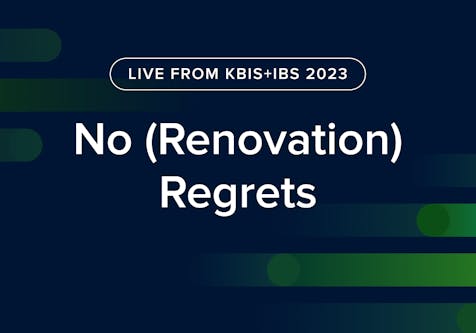Matt DiBara Builds Success Brick by Brick
Learn how the masonry pro forged a multimillion-dollar business — and why he didn’t stop there

Given that his firm, DiBara Masonry, has been in the family for four generations, Matt DiBara was practically born into the business of masonry and concrete. But while the company has seen plenty of success in its more than century-long history, DiBara has been instrumental in modernizing it — improving its processes, boosting marketing and branding efforts, and increasing leads. The result: growth like never before. Here’s how he did it.

An Early Start
“I was always very motivated at a young age to learn,” DiBara says. He started working at the family business at the tender age of nine, “at the very bottom, picking up trash on job sites,” he says. “And I grew quickly.” He went to trade school for masonry and concrete at age 15, and in no time was running a good part of the business.
“I was working, working, running projects at 16, 17 — full-on submittals, design meetings, project schedules, Gantt charts, prevailing wage projects and [working] with government officials,” he says. “I was literally at the table where I could barely see over the seat.”
DiBara realized early on how internet marketing and branding could expand the company’s reach, but his father was more old-school and not on board at first.
Then, after getting licensed at 19 and studying construction management at the University of Massachusetts Amherst, DiBara brought in so many leads from online platforms that his father began to see the light.
Phase #1: Landing More Projects
Around age 21, DiBara relocated the business from the East Coast to the West Coast. “I basically started from scratch with the confidence of what I had done with my dad,” he says. With scaling in mind, he saw bringing in more leads and projects as the first milestone.
At first, “the biggest thing I used Houzz Pro for was definitely on the lead gen side,” he says. “That was a big component for me, understanding how to elevate our brand. And I found that Houzz Pro attracted a certain type of customer, one that was more detail-oriented.”
Once DiBara increased leads, “I felt comfortable hiring people, knowing that I could keep them busy,” he says. “I have three months worth of work; I know that I can sell another three months in that time frame. That’s how I started.”
With improved lead generation and sales and a few crews in place, the business really started to pick up — and it was time for the next phase. “Somewhere around the million-and-a-half-dollar mark, things became a little bit more sophisticated,” DiBara says. “A lot of what I did in the beginning…was very much pain-driven. I didn’t have business acumen.” It became clear that to continue growing the company, he needed more help.

Phase #2: Improving Processes
He began hiring salespeople, seeking out mentors and contracting with consultants. And that led to the realization that better processes were in order. For instance, “I needed ways to impart my knowledge to [team members] in order to get me to check that box on the org chart off and say, ‘OK, they can handle this part of the business,’” DiBara says. “I had to develop certain systems and processes.”
Adopting software was a key part of that. “I started to look at companies that were where I wanted to go, and I couldn’t find one company that didn’t have a software to keep things in place,” he says. He initially resisted the idea, “because I wasn’t the most tech-savvy person,” he says, but couldn’t deny the positive results other companies were seeing.
So DiBara tried out Houzz Pro and, after analyzing the results of that and other platforms, quickly realized how much income it was generating for the company — at a value-oriented price. “For me, that was a big lightbulb moment, where I was like, ‘OK, I want to double, triple down on this. I think there’s a lot of opportunity here,’” he says.
He soon also appreciated how the software reduced human error through automation, how it fostered accountability through metrics, and much more. In other words, it became essential to scaling the business.
“Anytime we introduced software, our processes got better,” he says.
Phase #3: Making the Most of Software
DiBara was already using Houzz Pro for lead generation; then he began using the all-in-one software for project management as well, particularly for scheduling. “We used to do scheduling with notepads, and then we would do it on whiteboards, then Excel sheets,” DiBara says. Houzz Pro saves his team “three to five hours a week minimum,” he says.
He also discovered an unexpected benefit. “A lot of the general contractors and the designers we work with also use Houzz Pro,” he says. “Because we understand it, there’s been a big benefit. We started out selling design services, and then I realized…that if we refer certain design professionals, it makes our core business easier to grow.”

Phase #4: Branching Out
As if being in the residential, commercial and governmental sectors and working on high-profile projects, including celebrity homes, wasn’t enough, DiBara expanded into recruiting and staffing by launching The Contractor Consultants. The seed was sown a few years ago, when his team was having trouble hiring skilled field workers and managers.
“You couldn’t pay people enough,” he says. “You just couldn’t find them.… I made a commitment. I said, ‘No matter what it takes, no matter what it means, I’m going to master hiring in the new age.’” He traveled the country to talk with trade association presidents, took courses, read books, reached out to mentors, studied tech and analyzed the biggest companies — and all that effort paid off.
“I came up with a system. It fixed my problem,” he says. “Then I started fixing other people’s problems that I knew locally.” That led to presentations for trade associations and then a course of 63 video modules, and now The Contractor Consultants is a full-fledged nationwide hiring company.
What’s Next?
“Our construction company will continue to grow,” DiBara. I think there’s a lot of need in the commercial sector and the high-end residential space.… [But] the big thing for me now is around helping construction business owners hire and grow their teams” — because he knows just how important having the right team is to long-term success.
“I think one of the biggest things you can do outside of effective branding, lead gen, sales and implementing software is bringing great people under the fold of your company and keeping them motivated,” he says.
And you can hear more from Matt DiBara in person at the International Builders’ Show (IBS), held in Las Vegas from February 27 to 29, 2024. He’ll be at the Houzz Pro booth talking about how construction businesses can use staffing to reach their revenue goals, and how to find the right people to meet those needs. The Houzz Pro team will offer a range of informative sessions at the booth, covering trends, teams, sales, marketing and more. Come join us!

Want advice delivered to your inbox?
Unlock industry insights and updates for contractors and design pros
By signing up, I agree to the Houzz Terms of Use and Privacy Policy and that Houzz may use my information to contact me about relevant content, products, and services.














Join the conversation by commenting or asking a question below. The Houzz team reads every single comment, and we’ll get back to you by email if you need us!